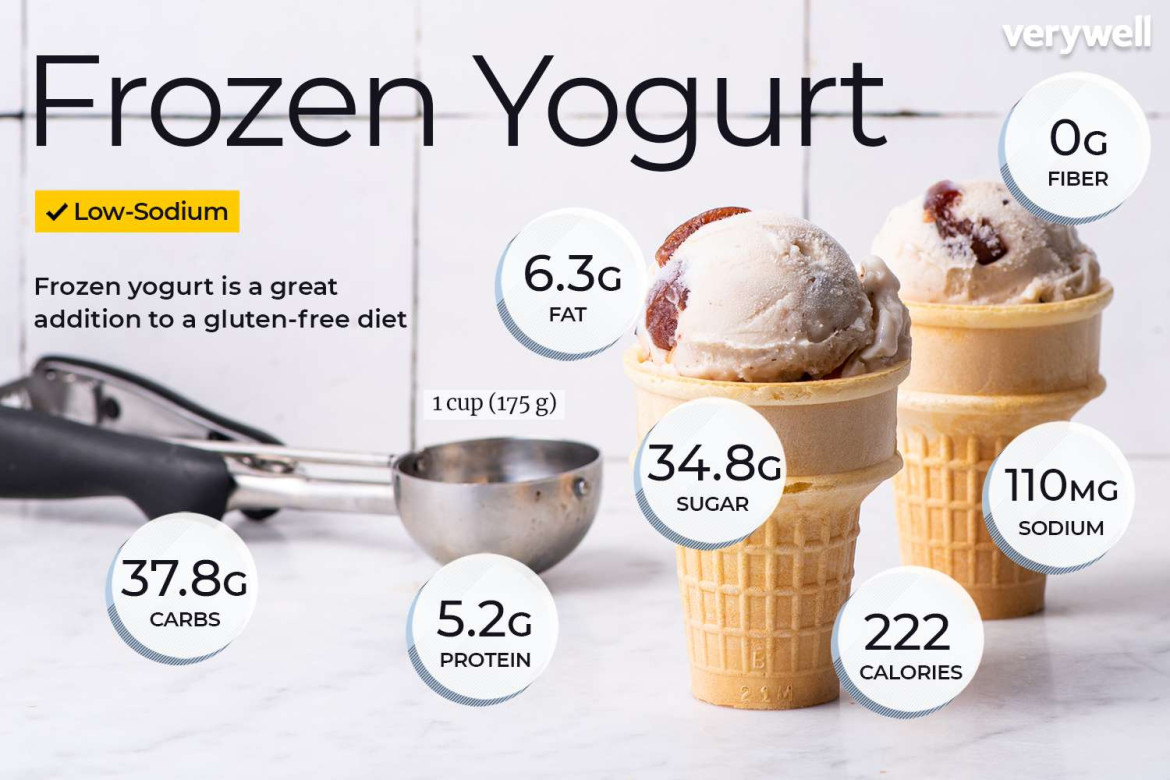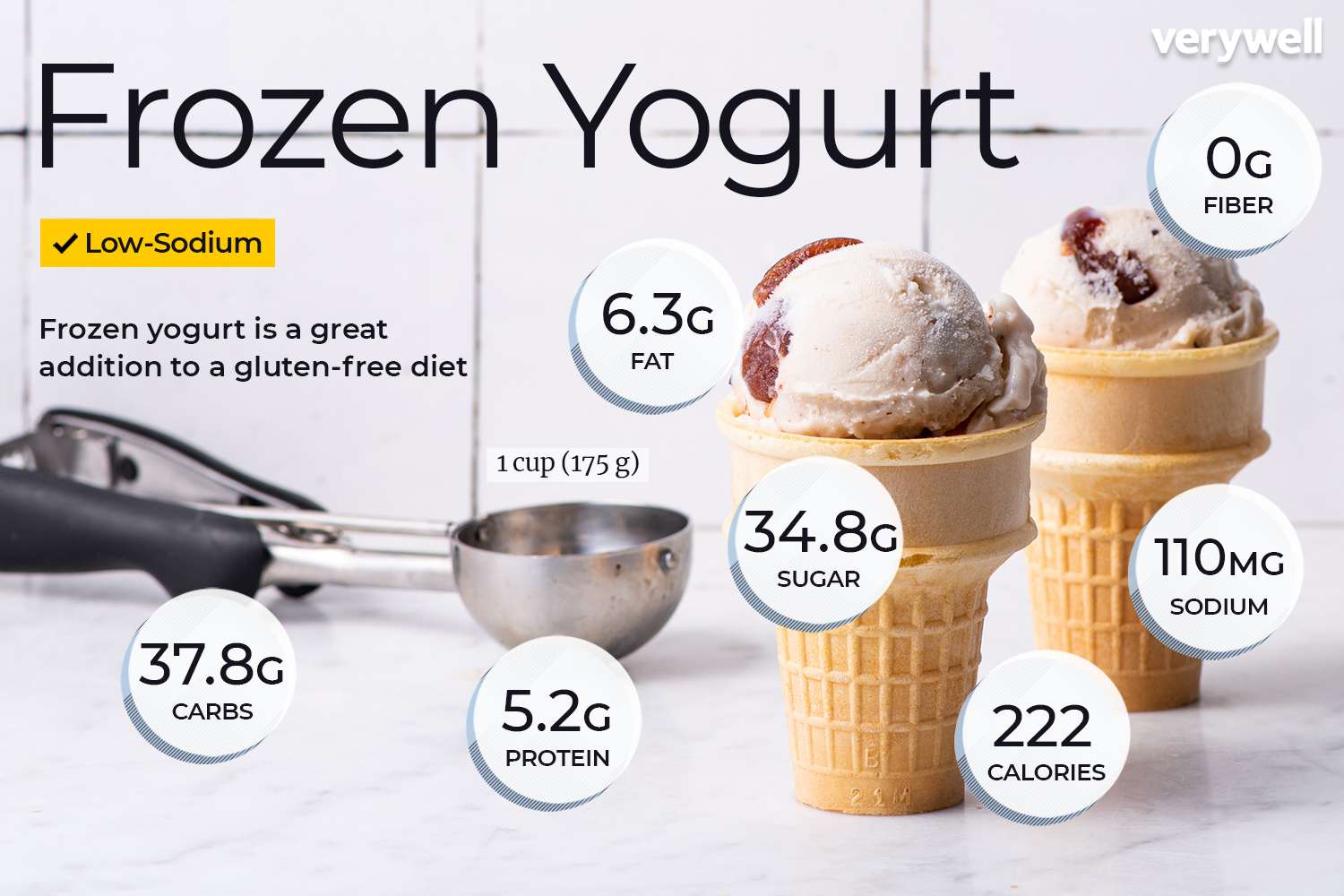
How Many Calories Are In Frozen Yogurt?
In this blog post, we'll explore the calorie counts of different types of frozen yogurt, discuss low-calorie recipes you can make at home, compare the caloric value of frozen yogurt to ice cream, and debunk common myths about Calories Are In Frozen Yogurt. We'll also provide tips on how to read nutrition labels and practice portion control to keep your frozen yogurt treats healthy and satisfying.
Introducing Frozen Yogurt and Its Benefits
Frozen yogurt is a frozen dessert made from yogurt, milk, and sugar. It's often served in soft-serve form and can be topped with a variety of sweet or savory toppings, including fruit, candy, nuts, and syrups. Some frozen yogurt shops allow customers to create their own custom flavors and toppings, making it a fun and interactive dessert option.
One of the main benefits of frozen yogurt is that it's typically lower in fat and calories than ice cream. According to the United States Department of Agriculture (USDA), a 1/2 cup serving of vanilla ice cream contains approximately 137 calories and 7 grams of fat, while the same serving size of plain frozen yogurt contains around 115 calories and 4 grams of fat.
Another advantage of frozen yogurt is that it contains beneficial probiotics, which are live bacteria and yeasts that are good for your digestive system. These probiotics can help improve gut health, boost immunity, and even reduce inflammation throughout the body.

Types of Frozen Yogurt and Their Calorie Counts
Not all frozen yogurts are created equal, and some varieties can be quite high in calories and sugar. Here are some common types of frozen yogurt and their average calorie counts per 1/2 cup serving:
- Plain frozen yogurt: 115-120 calories
- Low-fat frozen yogurt: 110-130 calories
- Non-fat frozen yogurt: 100-110 calories
- Greek frozen yogurt: 120-140 calories
- Fruit-flavored frozen yogurt: 120-150 calories
- Chocolate or candy-flavored frozen yogurt: 130-170 calories
It's important to note that these calorie counts are averages and can vary depending on the brand and specific flavor of frozen yogurt you choose. Some fruit-flavored frozen yogurts can contain added sugars, while chocolate or candy-flavored varieties may have more calories and fat due to added ingredients.
Readmore: Is frozen yogurt healthy for weight loss?
Low-Calorie Frozen Yogurt Recipes to Make at Home
If you're looking for a healthy and delicious frozen yogurt treat, making your own at home is a great option. Here are some low-calorie frozen yogurt recipes you can try:
Strawberry Banana Frozen Yogurt
Ingredients:
- 2 cups frozen strawberries
- 1 ripe banana
- 1/2 cup plain non-fat Greek yogurt
- 1 tablespoon honey
Directions:
- Combine all ingredients in a blender or food processor.
- Blend until smooth and creamy.
- Pour mixture into a freezer-safe container and freeze until firm, stirring every 30 minutes.
Chocolate Peanut Butter Frozen Yogurt
Ingredients:
- 2 cups plain non-fat Greek yogurt
- 1/4 cup cocoa powder
- 1/4 cup natural peanut butter
- 1/4 cup honey
Directions:
- Combine all ingredients in a blender or food processor.
- Blend until smooth and creamy.
- Pour mixture into a freezer-safe container and freeze until firm, stirring every 30 minutes.

Peach Frozen Yogurt
Ingredients:
- 2 cups frozen peach slices
- 1/2 cup plain non-fat Greek yogurt
- 1/4 cup honey
Directions:
- Combine all ingredients in a blender or food processor.
- Blend until smooth and creamy.
- Pour mixture into a freezer-safe container and freeze until firm, stirring every 30 minutes.
These recipes are all easy to make and can be customized with your favorite flavors and toppings. Plus, they're much lower in calories and sugar than most store-bought frozen yogurts.
Comparing the Caloric Value of Frozen Yogurt and Ice Cream
While frozen yogurt is typically lower in calories and fat than ice cream, it's important to note that not all frozen yogurts are healthier than all ice creams. Here's a comparison of the calorie counts for some common types of ice cream and frozen yogurt:
- Vanilla ice cream: 137 calories per 1/2 cup serving
- Chocolate ice cream: 143 calories per 1/2 cup serving
- Strawberry ice cream: 135 calories per 1/2 cup serving
- Plain frozen yogurt: 115-120 calories per 1/2 cup serving
- Fruit-flavored frozen yogurt: 120-150 calories per 1/2 cup serving

As you can see, some types of frozen yogurt can actually contain more calories than certain flavors of ice cream. It's important to read nutrition labels and choose lower-calorie options if you're trying to watch your calorie intake.
The Truth About 'Healthy' Frozen Yogurt Options
In recent years, many frozen yogurt shops have started promoting their products as healthier dessert options. However, it's important to examine these claims and do your own research before assuming that all frozen yogurts are healthy.
Some frozen yogurt shops use artificial sweeteners or sugar substitutes in their products, which can have negative health effects and may not be as healthy as they claim. Additionally, some shops offer a wide variety of high-calorie toppings, such as candy, cookies, and syrups, which can quickly turn a healthy dessert into a diet-busting indulgence.
If you're looking for a healthy frozen yogurt option, look for shops that offer natural ingredients and low-calorie toppings, or consider making your own at home using fresh fruit and non-fat Greek yogurt.
Readmore: Where to buy frozen yogurt?
How to Read Frozen Yogurt Nutrition Labels
Reading nutrition labels is an important part of making healthy choices when it comes to frozen yogurt. Here are some key things to look for on a frozen yogurt nutrition label:
- Serving size: Make sure you're comparing similar serving sizes when looking at different brands or types of frozen yogurt.
- Calories: Check the calorie count and make sure it fits within your daily calorie goals.
- Fat: Look for frozen yogurts that are low in saturated fat and trans fat.
- Sugar: Avoid frozen yogurts that contain high amounts of added sugars, as these can contribute to weight gain and other health problems.
- Protein: Choose frozen yogurts that are high in protein to help keep you full and satisfied.
It's also a good idea to look for frozen yogurts that contain live and active cultures, as these can provide additional health benefits.
The Importance of Portion Control When Eating Frozen Yogurt
While frozen yogurt can be a healthier dessert option than ice cream or other high-calorie treats, it's important to practice portion control to avoid overeating. Here are some tips for keeping your frozen yogurt portions under control:
- Stick to the serving size listed on the nutrition label.
- Use a smaller bowl or cup to limit the amount you eat.
- Avoid going back for seconds, even if you still feel hungry.
- Choose low-calorie toppings, such as fresh fruit or nuts, instead of high-calorie options like candy or cookies.
By practicing portion control, you can still enjoy a sweet treat without derailing your diet or overloading on calories.
Best Toppings for a Low-Calorie Frozen Yogurt Treat
One of the great things about frozen yogurt is that there are endless possibilities when it comes to toppings. However, some toppings can quickly add up in calories and sugar. Here are some low-calorie topping options to consider:
- Fresh fruit, such as berries, sliced bananas, or diced mango
- Chopped nuts, such as almonds, walnuts, or pecans
- Unsweetened coconut flakes
- Cinnamon or other spices
- Dark chocolate chips or cocoa powder (in moderation)
Avoid high-calorie toppings like candy, cookies, syrups, and whipped cream, which can add hundreds of calories to your dessert.

Debunking Common Myths About Frozen Yogurt and Calories
There are several myths and misconceptions surrounding frozen yogurt and its calorie count. Here are some common ones, debunked:
- Myth: All frozen yogurts are low in calories. Reality: Some frozen yogurts can actually be quite high in calories, especially if they contain added sugars or high-calorie toppings.
- Myth: Frozen yogurt is always a healthier choice than ice cream. Reality: While some frozen yogurts can be lower in calories and fat than certain types of ice cream, not all frozen yogurts are healthier than all ice creams.
- Myth: You can eat as much frozen yogurt as you want without gaining weight. Reality: Even though frozen yogurt may be lower in calories than other desserts, overeating can still lead to weight gain and other health problems.
By understanding the facts about frozen yogurt and its calorie count, you can make informed choices and enjoy this sweet treat in moderation.
Frozen Yogurt vs. Other Dessert Options: Which is the Healthiest Choice?
When it comes to choosing a healthy dessert option, there are many factors to consider. Here's a comparison of some common dessert options and their average calorie counts per 1/2 cup serving:
- Vanilla ice cream: 137 calories
- Chocolate cake: 385 calories
- Apple pie: 260calories
- Chocolate chip cookie: 200 calories
- Brownie: 240 calories
- Frozen yogurt: 100-170 calories (depending on the type and flavor)
As you can see, frozen yogurt is typically a lower-calorie option than many other dessert choices. However, it's important to choose your toppings wisely and practice portion control to keep your frozen yogurt treat healthy.
Conclusion
Tutti Frutti Frozen Yogurt can be a delicious and satisfying dessert option, especially if you're trying to watch your calorie intake or boost your gut health. By choosing lower-calorie varieties, making your own at home, and practicing portion control, you can enjoy this sweet treat without overindulging.
It's also important to read nutrition labels carefully, choose healthy toppings, and debunk common myths about frozen yogurt and its calorie count. With these tips in mind, you can enjoy a tasty and healthy frozen yogurt treat that satisfies your sweet tooth while supporting your overall health and wellness.
